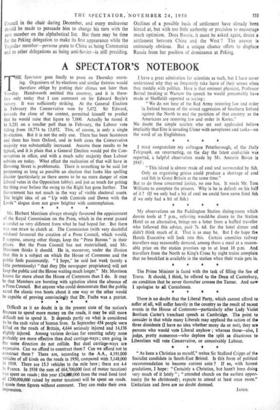Difficult as it no doubt is in the present state
of the nation's finances to spend more money on the roads, it may be still more difficult not to spend it. It depends partly on what is considered to be the cash value of human lives. In September 454 people were killed on the roads of Britain, 4,644 seriously injured and 14,136 slightly injured. Among various devices for ensuring safety none Probably are more effective than dual carriage-ways ; cars going in the same direction do not collide. But dual carriage-ways are expensive. Can we afford to construct them? Can we afford not to construct them ? There are, according to the A.A., 4,191,000 vehicles of all kinds on the roads in 1950, compared with 3,148,000 in 1939. There are 15.3 vehicles to the mile here ; there are 4.4 in France. In 1938 the sum of £64,700,000 (out of motor taxation) was spent on roads ; this year £24,080,000 from the road fund (out of £200,000,000 raised by motor taxation) will be spent on roads. I quote these figures without comment. They can make their own impression. I have a great admiration for scientists as such, but I have never understood why they so frequently take leave of their senses when they meddle with politics. Here is that eminent physicist, Professor Bernal (making at Warsaw the speech he would presumably have made at Sheffield) reported as saying : "We do not hear of the Red Army restoring law and order in Ireland because of the armed aggression of Southern Ireland against the North to end the partition of that country as the Americans are restoring law and order in Korea."
No doubt the simple scarlets who sat and applauded believe implicitly that Eire is invading Ulster with aeroplanes and tanks—on the word of an Englishman.














































































 Previous page
Previous page